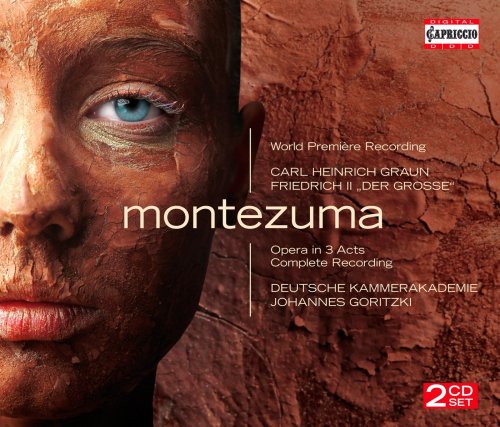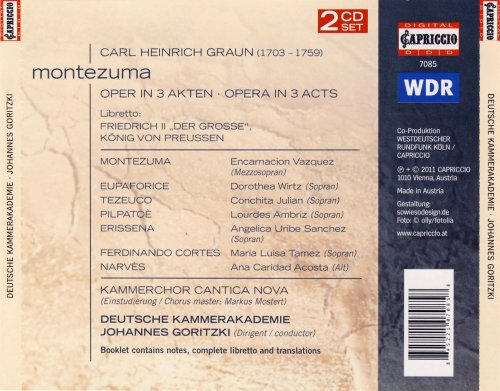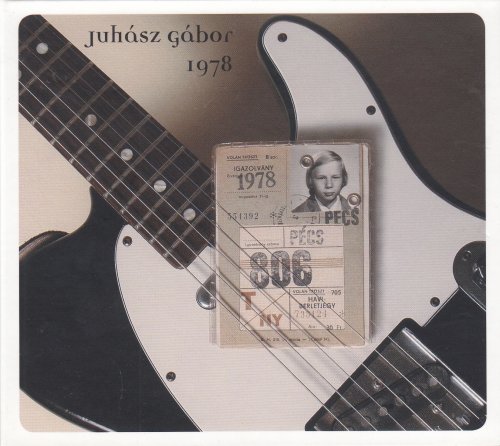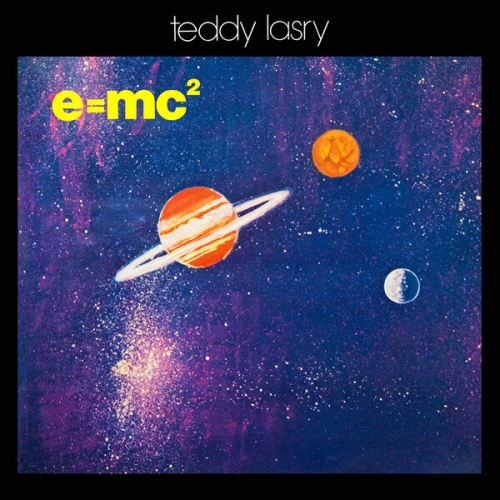Johannes Goritzki & Deutsche Kammerakademie Neuss - Karl Heinrich Graun: Montezuma (2011)

Artist: Johannes Goritzki & Deutsche Kammerakademie Neuss
Title: Karl Heinrich Graun: Montezuma
Year Of Release: 2011
Label: Capriccio
Genre: Classical
Quality: FLAC (tracks + .cue, log, scans)
Total Time: 02:16:48
Total Size: 658 MB
WebSite: Album Preview
Tracklist:Title: Karl Heinrich Graun: Montezuma
Year Of Release: 2011
Label: Capriccio
Genre: Classical
Quality: FLAC (tracks + .cue, log, scans)
Total Time: 02:16:48
Total Size: 658 MB
WebSite: Album Preview
CD 1
01. Sinfonia: 1. Allegro-2. Andante-3. Allegro - Deutsche Kammerakademie/Johannes Goritzki
02. Act One, Scene One: Recitativo: Si, Mio Tezeuco, Il Messico E Felice - Encarnacion Vazquez/Conchita Julian
03. Act One, Scene One: Aria: Somiglia il Buon Monarca - Conchita Julian
04. Act One, Scene One: Recitativo: Lo Ti Domando, Amico - Encarnacion Vazquez
05. Act One, Scene One: Aria: 'Non Saprei Curare il Vanto' - Encarnacion Vazquez
06. Act One, Scene Two: Recitativo: 'Ecco, Signor, Ch'Io Torno Fedele - Lourdes Ambriz
07. Act One, Scene Three: Recitativo: 'E ver: Quanto Narrai Incredibil Rassembra' - Lourdes Ambriz
08. Act One, Scene Three: Aria: 'Vegga, Che Alfin Gl'Impone' - Lourdes Ambriz
09. Act One, Scene Four: Recitativo: 'Regina, A Che Si Mesta?' - Angelica Uribe Sanchez/Dorthea Wirtz
10. Act One, Scene Four: Area: 'Godi L'amabile Presente Instante' - Angelica Uribe Sanchez
11. Act One, Scene Five: Recitativo: 'Leggiadra Eupaforice' - Encarnacion Vazquez
12. Act One, Scene Five: Aria: 'Ah Immaginar Non Puoi' - Dorthea Wirtz
13. Act One, Scene Six: Recitativo: 'Ah! Signor, Che Deluso An Que Stranieri' - Lourdes Ambriz
14. Act One, Scene Seven: Recitativo: 'Imperatore, il Valoroso E Forte Duce' - Ana Caridad Acosta/Encarnacion Vazquez
15. Act One, Scene Seven: Aria: 'Vedrai Fra Queste Mura' - Ana Caridad Acosta
16. Act One, Scene Eight: Recitativo: 'Qual Fierezza A Costui' - Encarnacion Vazquez/Lourdes Ambriz/Dorothea Wirtz
17. Act One, Scene Nine: Recitativo: 'Or Tu Vedi, Erissena' - Angelica Uribe Sanchez/Dorothea Wirtz
18. Act One, Scene Nine: Aria: 'Non An Calma Le Mie Pene' - Dorothea Wirtz
19. Act Two, Scene One: Intro - Deutsche Kammerakademie/Johannes Goritzki
20. Act Two, Scene One: Recitativo: 'Eccoci Alfine, Grazie Al Cielo' - Ana Caridad Acosta/Maria Luisa Tamez
21. Act Two, Scene Two: Chor: 'Vinite Intrepidi Stranieri Eroi' - Kammerchor Cantica Nova/Markus Mostert
22. Act Two, Scene Two: Recitativo: 'Vieni, Illustre Stranier' - Encarnacion Vazquez/Maria Luisa Tamez
23. Act Two, Scene Three: Aria: 'Passaggero, Che Tenta La Sorte Sovra Un Legno' - Conchita Julian
24. Act Two, Scene Four: Recitativo: 'Qual Fatal Sicurezza!' - Lourdes Ambriz
25. Act Two, Scene Four: Aria: 'Erra Quel Nobil Core' - Lourdes Ambriz
26. Act Two, Scene Five: Recitativo: 'Si, Del Soggiorno Imperial' - Conchita Julian/Maria Luisa Tamez
27. Act Two, Scene Five: Sinf Guerriera - Deutsche Kammerakademie/Johannes Goritzki
CD 2
01. Act Two, Scene Six: Recitativo: 'D'onde Vengon Quei Tuoni?' - Encarnacion Vazquez/Maria Luisa Tamez
02. Act Two, Scene Seven: Recitativo: 'Ecco La Tua Riconoscenza!' - Encarnacion Vazquez/Maria Luisa Tamez
03. Act Two, Scene Seven: Aria: 'Benche Superbo E Vano, Renditi Al Vincitor' - Maria Luisa Tamez
04. Act Two, Scene Seven: Recitativo: 'No, Che Un Nume Non Sei' - Encarnacion Vazquez
05. Act Two, Scene Seven: Aria: 'Del Mio Destin Tiranno Tutto L'orrore' - Encarnacion Vazquez
06. Act Two, Scene Eight: Recitativo: 'Mingannate, Occhi Miei?' - Dorothea Wirtz/Maria Luisa Tamez
07. Act Two, Scene Nine: Recitativo: 'Deh, Lascia Un Prence Omai' - Maria Luisa Tamez
08. Act Two, Scene Eight: Aria: 'Barbaro, Barbaro' - Dorothea Wirtz
09. Act Two, Scene Nine: Aria: 'Secondin Gli Dei Si Giusto Disegno' - Conchita Julian
10. Act Two, Scene Nine: Aria: 'L'onor Del Soglio Offende' - Dorothea Wirtz
11. Act Three, Scene One: Recitativo: 'Qual Orribil Destino' - Encarnacion Vazquez
12. Act Three, Scene One: Aria: 'Ah, D'inflessibil Sorte' - Encarnacion Vazquez
13. Act Three, Scene One: Recitativo: 'Ma Qual Rumore Mi Risuona All' Orecchio?' - Encarnacion Vazquez
14. Act Three, Scene One: Duetto: 'Ah Sol Per Te, Ben Mio' - Encarnacion Vazquez/Dorothea Wirtz
15. Act Three, Scene Two: Recitativo: 'Ah Scoperti, O Regina' - Angelica Uribe Sanchez/Encarnacion Vazquez/Dorothea Wirtz
16. Act Three, Scene Three: Recitativo: 'Ahime! Tutto, O Regina, Che Barbaro Destin!' - Conchita Julian/Encarnacion Vazquez/Dorothea Wirtz
17. Act Three, Scene Four: Recitativo: 'Empio, Cadrai Trafitto' - Maria Luisa Tamez/Lourdes Ambriz
18. Act Three, Scene Five: Recitativo: 'Signor, Qui Moctezuma Ti Traggo E La Regina' - Ana Caridad Acosta
19. Act Three, Scene Five: Aria: 'Si, Per La Rea Congiura' - Maria Luisa Tamez
20. Act Three, Scene Five: Recitativo: 'Tinganni, Egli Non Fu' - Dorothea Wirtz/Maria Luisa Tamez/Encarnacion Vazquez
21. Act Three, Scene Five: Aria: 'Si, Corona I Tuoi Trofei' - Encarnacion Vazquez
22. Act Three, Scene Five: Recitativo: 'Ah, Mio Sposo Adorato!' - Dorothea Wirtz
23. Act Three, Scene Five: Recitativo: 'Deh, Qual Rabbia Ostinata!' - Maria Luisa Tamez
24. Act Three, Scene Five: Chor: 'Oh Cielo! Ahi Giorno Orribile' - Kammerchor Cantica Nova/Markus Mostert

Carl Heinrich Graun (1703/4–59) was one of the two most famous composers of Italian opera in 18th-century Germany, his only serious rival being Johann Adolf Hasse at the court in Dresden. He was the court composer of Prussian King Frederick the Great. He wrote at least 26 highly acclaimed operas for the Berlin Unter den Linden opera house that Frederick built for that purpose, in addition to the six he had written for an earlier patron. Now, 250 years later, with the disappearance of René Jacob’s 1996 Cesare e Cleopatra from the Harmonia Mundi catalog, this recording of Graun’s 1755 opera Montezuma is the only example of an operatic output that rivals that of near-contemporary George Frideric Handel. And this is not even a new recording, but rather the latest incarnation—midprice this time—of a West German Radio recording made in 1992 and available on CD since 1995.
Frederick II, who was by contemporary standards—and certainly those of his autocratic father, Frederick William I—an enlightened ruler, encouraged the arts and philosophy, courted friendship with Voltaire, and was himself a musician of some accomplishment. He closely supervised all aspects of court culture, writing libretti as he did for Montezuma , playing the flute, even composing an occasional aria for insertion into Graun’s work, and mostly making sure that his relatively conservative tastes were satisfied. Despite this royal involvement—or maybe because of it; who knows—Graun produced operas that, on the limited evidence, were accomplished and in some ways progressive, especially in the use of more dramatic recitative and in some enhancements to the da capo aria. They were not works of genius to set beside Handel’s best work in the genre, but solid works that seemed likely to survive his death in 1759. (Actually, that was more than could be said of Handel’s Gay-damaged operas when he died the same year.) Of course, celebrity as an opera composer faded quickly when Gluck produced the first of his reform operas Orfeo ed Euridice in 1762, setting the seal of obsolescence on Graun’s and all of the operas of the Baroque.
Montezuma pits an enlightened Aztec ruler against the brutal warrior Hernán Cortés as it uses the overthrow of the Aztec empire as a backdrop to the personal conflicts and tragedy of Montezuma, Cortés, and especially the fiancée of Montezuma, the fictional Eupaforice, Queen of Tlascála. Inspired perhaps by criticisms of Cortés’ mistreatment of Native Americans by such authors as 16th-century friar Bartolomé de las Casas, Frederick’s libretto follows the events arising from Montezuma’s welcome of Cortés on the mistaken belief that he was the reincarnation of the god Quetzalcoatl. It traces the doubts of some of Montezuma’s advisors, the treacherous subjugation of the Aztecs in battle, the taking of Montezuma as hostage, his murder by his own subjects, the rape of Eupaforice by Cortés, and her suicide.
Decca released a now out-of-print disc of excerpts of the opera in 1967 starring Joan Sutherland as Eupaforice. Her regal performance provides an unfortunate contrast to that of Dorothea Wirtz on this release. Wirtz, a lyric coloratura with a fluttery quality, is an odd choice for such a dramatic role. While not to Sutherland’s standards, she does handle the challenging and extensive passagework well, which is the norm for all of the members of this all-female cast. Other cast members are all Mexican artists, which given the opera’s setting hints at an interesting story about which the notes are mute. Also unclear is why the five castrato roles are all assigned to females instead of countertenors.
The best of the singers is Maria Luisa Tamez, the Cortés, whose sharply focused mezzo voice, technical facility, and incisive diction create a plausibly evil man. Her dramatic use of sotto voce is particularly chilling. Ana Caridad Acousta also excels as Spanish Captain Narvès with a very masculine use of her darker contralto and some exciting coloratura. Somewhat less impressive is the Montezuma of Encarnacion Vazquez, who has sufficient depth of voice and dramatic gravitas for the tragic character, but labors a bit on the coloratura and has no trill.
Johannes Goritzki moves the music along smartly, but misses dramatic opportunities with a rather generalized approach. The short Sinfonia guerriera and the tragic final chorus, “Oh Cielo! Ahi giorno orribile,” are jarringly jaunty, though surely Graun is much to blame; Richard Bonynge is but a bit more solemn. One wonders, though, what Harnoncourt would be able to do with them. The modern-instrument German Chamber Academy of Neuss is alert and accurate. The production values are generally high, with outstanding engineering, and the only reason to complain is the lack of libretto, or even reasonable synopsis, in English. Despite the promise in English on the outside of the box of “notes, complete libretto, and translations,” the only translation of the Italian text is in German.
Still, all criticisms aside, one must be very thankful that this recording exists to give us a glimpse of the skills of this now mostly forgotten composer. Graun’s work, and this recording, are well worth the acquaintance of anyone interested in Baroque opera. -- FANFARE: Ronald E. Grames
Frederick II, who was by contemporary standards—and certainly those of his autocratic father, Frederick William I—an enlightened ruler, encouraged the arts and philosophy, courted friendship with Voltaire, and was himself a musician of some accomplishment. He closely supervised all aspects of court culture, writing libretti as he did for Montezuma , playing the flute, even composing an occasional aria for insertion into Graun’s work, and mostly making sure that his relatively conservative tastes were satisfied. Despite this royal involvement—or maybe because of it; who knows—Graun produced operas that, on the limited evidence, were accomplished and in some ways progressive, especially in the use of more dramatic recitative and in some enhancements to the da capo aria. They were not works of genius to set beside Handel’s best work in the genre, but solid works that seemed likely to survive his death in 1759. (Actually, that was more than could be said of Handel’s Gay-damaged operas when he died the same year.) Of course, celebrity as an opera composer faded quickly when Gluck produced the first of his reform operas Orfeo ed Euridice in 1762, setting the seal of obsolescence on Graun’s and all of the operas of the Baroque.
Montezuma pits an enlightened Aztec ruler against the brutal warrior Hernán Cortés as it uses the overthrow of the Aztec empire as a backdrop to the personal conflicts and tragedy of Montezuma, Cortés, and especially the fiancée of Montezuma, the fictional Eupaforice, Queen of Tlascála. Inspired perhaps by criticisms of Cortés’ mistreatment of Native Americans by such authors as 16th-century friar Bartolomé de las Casas, Frederick’s libretto follows the events arising from Montezuma’s welcome of Cortés on the mistaken belief that he was the reincarnation of the god Quetzalcoatl. It traces the doubts of some of Montezuma’s advisors, the treacherous subjugation of the Aztecs in battle, the taking of Montezuma as hostage, his murder by his own subjects, the rape of Eupaforice by Cortés, and her suicide.
Decca released a now out-of-print disc of excerpts of the opera in 1967 starring Joan Sutherland as Eupaforice. Her regal performance provides an unfortunate contrast to that of Dorothea Wirtz on this release. Wirtz, a lyric coloratura with a fluttery quality, is an odd choice for such a dramatic role. While not to Sutherland’s standards, she does handle the challenging and extensive passagework well, which is the norm for all of the members of this all-female cast. Other cast members are all Mexican artists, which given the opera’s setting hints at an interesting story about which the notes are mute. Also unclear is why the five castrato roles are all assigned to females instead of countertenors.
The best of the singers is Maria Luisa Tamez, the Cortés, whose sharply focused mezzo voice, technical facility, and incisive diction create a plausibly evil man. Her dramatic use of sotto voce is particularly chilling. Ana Caridad Acousta also excels as Spanish Captain Narvès with a very masculine use of her darker contralto and some exciting coloratura. Somewhat less impressive is the Montezuma of Encarnacion Vazquez, who has sufficient depth of voice and dramatic gravitas for the tragic character, but labors a bit on the coloratura and has no trill.
Johannes Goritzki moves the music along smartly, but misses dramatic opportunities with a rather generalized approach. The short Sinfonia guerriera and the tragic final chorus, “Oh Cielo! Ahi giorno orribile,” are jarringly jaunty, though surely Graun is much to blame; Richard Bonynge is but a bit more solemn. One wonders, though, what Harnoncourt would be able to do with them. The modern-instrument German Chamber Academy of Neuss is alert and accurate. The production values are generally high, with outstanding engineering, and the only reason to complain is the lack of libretto, or even reasonable synopsis, in English. Despite the promise in English on the outside of the box of “notes, complete libretto, and translations,” the only translation of the Italian text is in German.
Still, all criticisms aside, one must be very thankful that this recording exists to give us a glimpse of the skills of this now mostly forgotten composer. Graun’s work, and this recording, are well worth the acquaintance of anyone interested in Baroque opera. -- FANFARE: Ronald E. Grames



![Darwisch Basem, Cairo Steps - Samu (2026) [Hi-Res] Darwisch Basem, Cairo Steps - Samu (2026) [Hi-Res]](https://img.israbox.com/img/2026-01/27/7gqn8nu7q3vihtxlogj6j24fb.jpg)



![Neon Ion - Laugh Now, Cry Later (2026) [Hi-Res] Neon Ion - Laugh Now, Cry Later (2026) [Hi-Res]](https://www.dibpic.com/uploads/posts/2026-01/1769524864_folder.jpg)
